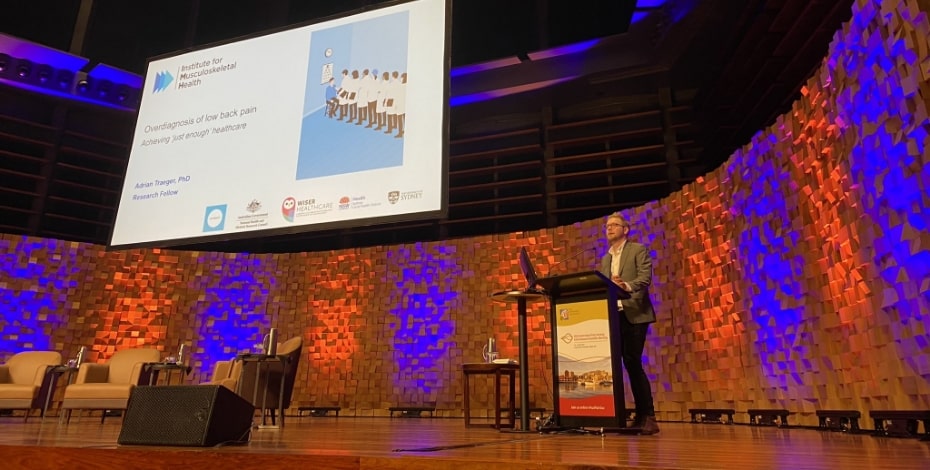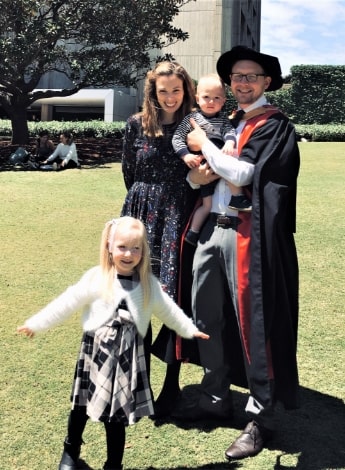
Quest for knowledge drives pain researcher

Like most in the profession, Adrian Traeger APAM became a physiotherapist to help improve people’s health. He also had a keen interest in understanding when healthcare doesn’t help people—and how to stop that happening. For his research work, Adrian has been named this year’s Rising Star Award winner at the Australian Pain Society’s conference.
Those who best understand Adrian Traeger’s passion for research and his fondness for the PEDro research database affectionately call him ‘Adro’.
It’s a friendly nod to Adrian’s dedicated pursuit of answers to some deep and perplexing research questions.
However, Adrian wasn’t always the self-confessed research nerd that he is today.
While halfway through a degree in exercise science at the University of New South Wales in 2005, Adrian became very interested in becoming a physiotherapist.
He shifted gears and entered the master’s program at the University of Sydney, graduating in 2007.
While at the university, Adrian got his first taste of research—and was entranced.
‘I was interested in the diagnosis of musculoskeletal problems and that wasn’t something that was part of exercise science training,’ Adrian says.
‘Very early on I had an interest in research, but first I wanted to work for a while and develop some research questions in the clinic with real people.’
For the next seven years, Adrian worked in primary care in a private practice in Hunters Hill, Sydney.
At the family practice, Hunters Hill Physiotherapy, Adrian was exposed to a broad range of musculoskeletal work, seeing clients of all ages and working with sporting teams, including the famed St Joseph’s College rugby team.
He relished the opportunity to diagnose clients’ conditions, all the while forming those very important research questions that would lead him to leave clinical practice and pursue a full-time PhD.
‘I gave myself five years in practice because even when I was training at Sydney Uni, I had an interest in research.
'I was always interested in randomised trials and the PEDro database was a big interest of mine,’ Adrian says.
‘I became a bit of an advocate for it, even in my training.
'It got to the point where some people would say to me, “Are you still banging on about PEDro?’’
'It’s funny to reflect on that 15 years later.’
(Adrian recently joined the Steering Committee for PEDro.)
‘Then I thought I’d give myself five years to pursue the PhD; mainly I started off wanting to teach but then the more I began doing research, the more I enjoyed the research aspect of the PhD,’ he says.
‘I’m really interested in the concept of healthcare that can have the opposite effects to what you think it’s going to have.
‘I think people generally assume that when you have access to healthcare, it always improves your health.
'But the more reading I did and the more research I did, the more I discovered the problem of overdiagnosis.
'It was a compelling problem because it’s about when the care we give people causes more harm than good.
'Nobody wants that.’
Adrian is now a postdoctoral research fellow at the Institute for Musculoskeletal Health, a division of the Faculty of Medicine and Health at the University of Sydney.
He completed his doctorate at Neuroscience Research Australia, which is affiliated with the University of New South Wales, looking at how best to reassure patients with low back pain.
He also began working with a research collaboration called the Wiser Healthcare collaboration, which looks at overdiagnosis more broadly, outside of back pain.
Adrian focuses on developing strategies to improve healthcare for low back pain and other musculoskeletal conditions and is currently investigating ways to reduce unnecessary diagnostic imaging for low back pain.
He was recently awarded more than $1.1 million by the National Health and Medical Research Council to lead a clinical trial of behavioural nudging interventions to reduce unnecessary care for low back pain in the emergency department.
Other interests include overdiagnosis and overtreatment, communicating research evidence to healthcare consumers and evidence-based practice.
For his work in the field of low back pain, the 2022 Rising Star Award was bestowed on Adrian at the Australian Pain Society’s 42nd annual scientific meeting in Hobart in April.
Adrian recalls the moment the email from the Australian Pain Society landed in his inbox.
‘In research, you get used to rejection as part of the job—and 19 times out of 20 the emails regarding grants, publications or awards come back and the first line reads, “We regret to inform you...”
'But this one, when I opened it, had a distinctly different first line, so I thought, “Oh, wow!’’
'It was an exciting moment.’
The award not only recognises the years of work Adrian has done but also shines a light on his key area of research, the overdiagnosis of low back pain.

Adrian with his family at his PhD graduation in 2017 at the University of New South Wales.
In accepting his award, Adrian was invited to speak on the topic on the final day of the conference at the Hotel Grand Chancellor in Hobart.
Ahead of that presentation, Adrian told InMotion that he was always looking to understand the balance between underuse and overuse of healthcare.
‘One aspect of overdiagnosis relates to the use of imaging for back pain.
'We know that imaging is a test physios can order but mostly it’s done by GPs and then physios will see a patient after they’ve had their scans,’ Adrian says.
‘We have to sit down with the patient and explain what it means.
'We’ve known for some time that imaging everyone who has a back problem doesn’t tend to improve people’s outcomes, except for that very small proportion of people who really need an urgent scan.
'You might think they have a serious problem that needs to be picked up with imaging, but for everyone else we know that the imaging doesn’t really improve outcomes.
‘A lot of my work looks at how to ensure people who need imaging still get the test, but then try to reduce the number of people who get an unnecessary scan.
'One thing we know about imaging results, and many clinicians will know this, is that people can get very worried by what’s written on that imaging report.
'The report uses scary words like “degeneration” and “bulging discs”.
'And that can lead people to then pursue unproven treatments, such as surgery, injections… some of these options can cause more harm than good.
'My research has been looking at how to reduce the harm and how to improve the use of imaging as an important tool but something that is not to be overdone.’
Part of Adrian’s research work examines different professions across the medical landscape, not just physiotherapy, and it focuses on how to improve healthcare so that it genuinely helps people.
‘We become physios to improve people’s health and to help people.
'So I wanted to understand when healthcare doesn’t help and how we can stop that from happening.
'The more we know about it, the more we can improve our profession.’
He hopes that the next generation of physiotherapists will also take up the research mantle, finding mentors of the kind who helped feed his own curiosity in research.
Surrounding yourself with successful people, he says, helps guide your career as a researcher.
Recently, the student has become the master—Adrian is now mentoring several PhD students, including Dr Sweekriti Sharma, a sociologist by training, who received her PhD in 2021.
‘My PhD supervisor, Professor James McAuley, is someone who has inspired me to continue on my research journey.
'He showed me what a well-functioning research group looks like, like the very cohesive research group he leads at Neuroscience Research Australia.
'And my current manager is Professor Chris Maher, who has been an incredibly supportive mentor, as have Professor Rachelle Buchbinder and Professor Kirsten McCaffery.
'They’ve mentored me throughout my postdoctoral work within the Wiser Healthcare collaboration.
'They’re from diverse professional and research backgrounds and have each had a huge impact on my career.
'I’m very grateful to them.’
Main image: Adrian Traeger discussing the over-diagnosis of low back pain after receiving the Rising Star Award.
© Copyright 2024 by Australian Physiotherapy Association. All rights reserved.





